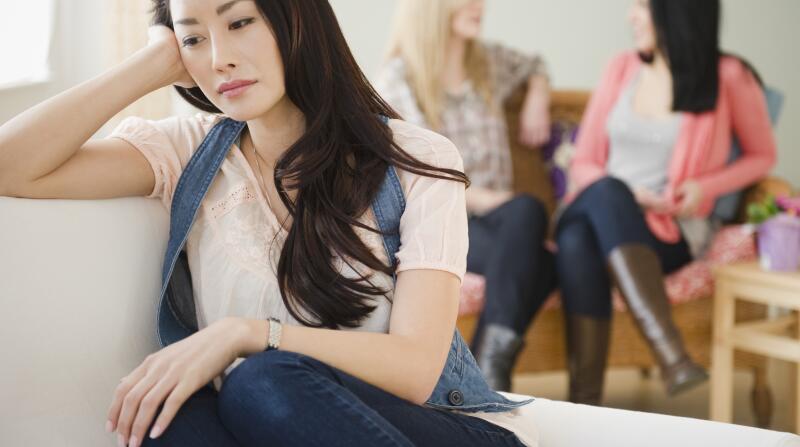9 Things to Know About Social Anxiety

Medically Reviewed By William C. Lloyd III, MD, FACS
Written By Gwen Rice on September 7, 2020
-
 More Than Being ShyWe all get nervous around crowds sometimes, but social anxiety is more than feeling uncomfortable when you’re asked to give a speech in front of a group. Social anxiety disorder is a strong fear of being judged by others or being embarrassed in public, in situations such as meeting a new person, or when attending an event. This fear is so pervasive that it can interfere with school, work and other activities of daily life. Whether you have symptoms of social anxiety or know someone who does, keep these facts in mind about this often misunderstood condition.
More Than Being ShyWe all get nervous around crowds sometimes, but social anxiety is more than feeling uncomfortable when you’re asked to give a speech in front of a group. Social anxiety disorder is a strong fear of being judged by others or being embarrassed in public, in situations such as meeting a new person, or when attending an event. This fear is so pervasive that it can interfere with school, work and other activities of daily life. Whether you have symptoms of social anxiety or know someone who does, keep these facts in mind about this often misunderstood condition. -
 Millions of Americans have social anxiety.Social anxiety affects about 7% of the American population—roughly 22 million people—according to the latest government epidemiological data. So even if you’re not affected personally by social anxiety, there’s a good chance you have a friend or colleague who is. And if you do have social anxiety, know you’re far from alone.
Millions of Americans have social anxiety.Social anxiety affects about 7% of the American population—roughly 22 million people—according to the latest government epidemiological data. So even if you’re not affected personally by social anxiety, there’s a good chance you have a friend or colleague who is. And if you do have social anxiety, know you’re far from alone. -
-
 The symptoms of social anxiety can be debilitating—and misunderstood.While people with social anxiety frequently want to make friends and be included in social outings, their extreme, uncontrollable fears can get in the way. On the outside they may seem shy and quiet, inhibited, nervous, aloof or disinterested. They may also look visibly upset— blushing or shaking, breaking out in a sweat, and having trouble meeting others’ eyes. Because other people may not be aware of this disorder, these symptoms can be misinterpreted negatively, causing further isolation for the person with social anxiety.
The symptoms of social anxiety can be debilitating—and misunderstood.While people with social anxiety frequently want to make friends and be included in social outings, their extreme, uncontrollable fears can get in the way. On the outside they may seem shy and quiet, inhibited, nervous, aloof or disinterested. They may also look visibly upset— blushing or shaking, breaking out in a sweat, and having trouble meeting others’ eyes. Because other people may not be aware of this disorder, these symptoms can be misinterpreted negatively, causing further isolation for the person with social anxiety. -
 Social anxiety is about more than public speaking.While everyone gets nervous when they’re the center of attention, people with social anxiety disorder can have difficulty with common, everyday situations. Meeting new people, making new friends, speaking up in a meeting, using a public restroom, eating or drinking in front of others, even talking on the phone: All of these can cause crippling fear for someone with social anxiety disorder.
Social anxiety is about more than public speaking.While everyone gets nervous when they’re the center of attention, people with social anxiety disorder can have difficulty with common, everyday situations. Meeting new people, making new friends, speaking up in a meeting, using a public restroom, eating or drinking in front of others, even talking on the phone: All of these can cause crippling fear for someone with social anxiety disorder. -
 Social anxiety causes physical symptoms.People often think of any type of anxiety, including social anxiety, solely as an emotional or mental condition. But in a difficult social situation, people with social anxiety may feel hot and panicky, or their hearts might race. Their throats may feel dry and their muscles might twitch. They may even feel nauseated. If you have social anxiety, talk to your doctor about learning calming techniques that can help manage these symptoms when they strike.
Social anxiety causes physical symptoms.People often think of any type of anxiety, including social anxiety, solely as an emotional or mental condition. But in a difficult social situation, people with social anxiety may feel hot and panicky, or their hearts might race. Their throats may feel dry and their muscles might twitch. They may even feel nauseated. If you have social anxiety, talk to your doctor about learning calming techniques that can help manage these symptoms when they strike. -
 Social anxiety extends beyond a specific moment.In private, people with social anxiety spend a lot of time analyzing their interactions with others, both before or after they take place. For example, sufferers may feel deep worry about giving an important presentation at work for weeks beforehand, imagining all the terrible things that could go wrong. Similarly, after a trigger event they may replay conversations in their minds over and over, scrutinizing their gaffes or bungled attempts at communicating and fitting in. During these endless ruminations, they often exaggerate their own character flaws and judge themselves harshly.
Social anxiety extends beyond a specific moment.In private, people with social anxiety spend a lot of time analyzing their interactions with others, both before or after they take place. For example, sufferers may feel deep worry about giving an important presentation at work for weeks beforehand, imagining all the terrible things that could go wrong. Similarly, after a trigger event they may replay conversations in their minds over and over, scrutinizing their gaffes or bungled attempts at communicating and fitting in. During these endless ruminations, they often exaggerate their own character flaws and judge themselves harshly. -
-
 Social anxiety may be genetic.Social anxiety disorder often runs in families, and typically appears in a person’s early teens. Researchers believe that people who already have weak social skills or trouble interpreting others’ behavior are more prone to suffer from social anxiety. Stress and environmental factors may also play a role.
Social anxiety may be genetic.Social anxiety disorder often runs in families, and typically appears in a person’s early teens. Researchers believe that people who already have weak social skills or trouble interpreting others’ behavior are more prone to suffer from social anxiety. Stress and environmental factors may also play a role. -
 Social anxiety is not a choice.Just like you can’t tell a person with the flu to simply “get better,” you can’t tell someone with social anxiety to just “get over it.” Sufferers certainly don’t choose to be affected and it’s not something they can decide to correct on their own through sheer force of will. Most people with social anxiety know their fears are irrational, but cannot manage them alone without help from a medical professional.
Social anxiety is not a choice.Just like you can’t tell a person with the flu to simply “get better,” you can’t tell someone with social anxiety to just “get over it.” Sufferers certainly don’t choose to be affected and it’s not something they can decide to correct on their own through sheer force of will. Most people with social anxiety know their fears are irrational, but cannot manage them alone without help from a medical professional. -
 Social anxiety doesn’t mean being anti-social.While people with social anxiety disorder can experience severe symptoms in specific situations, like attending a large cocktail party or having one-on-one discussions with their boss, in many cases they feel just fine in the company of other people. Typically, this means someone close and familiar—perhaps a parent, sibling or a couple of best friends. Most people with social anxiety want to go out and spend time with the people they care about, despite the stress they feel in other social situations.
Social anxiety doesn’t mean being anti-social.While people with social anxiety disorder can experience severe symptoms in specific situations, like attending a large cocktail party or having one-on-one discussions with their boss, in many cases they feel just fine in the company of other people. Typically, this means someone close and familiar—perhaps a parent, sibling or a couple of best friends. Most people with social anxiety want to go out and spend time with the people they care about, despite the stress they feel in other social situations. -
 Social anxiety can be treated.For someone with social anxiety—and the people around them—the symptoms can be frustrating and overwhelming. Fortunately, there are several treatment options available. With cognitive behavioral therapy, patients learn strategies for thinking, behaving and reacting to situations in ways that will help them feel less anxious or fearful. Anti-anxiety drugs, antidepressants, monoamine oxidase inhibitors (MAOIs), and beta-blockers can also be prescribed to reduce the mental and physical effects of the condition. In many cases, a combination of therapy and prescription drugs is the most effective course of action.Have an open and honest conversation with your doctor about your social anxiety symptoms so you can work together to find the best treatment plan for you.
Social anxiety can be treated.For someone with social anxiety—and the people around them—the symptoms can be frustrating and overwhelming. Fortunately, there are several treatment options available. With cognitive behavioral therapy, patients learn strategies for thinking, behaving and reacting to situations in ways that will help them feel less anxious or fearful. Anti-anxiety drugs, antidepressants, monoamine oxidase inhibitors (MAOIs), and beta-blockers can also be prescribed to reduce the mental and physical effects of the condition. In many cases, a combination of therapy and prescription drugs is the most effective course of action.Have an open and honest conversation with your doctor about your social anxiety symptoms so you can work together to find the best treatment plan for you.
9 Things to Know About Social Anxiety















